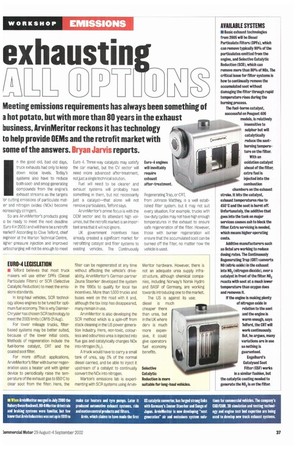EURO-4 LEGISLATION II Telford believes that most truck makers will
Page 37

If you've noticed an error in this article please click here to report it so we can fix it.
use either DPFs (Diesel Particulate Filters) or SCR (Selective Catalytic Reduction) to meet the emissions standards.
In long-haul vehicles, SCR technology allows engines to be tuned for optimum fuel economy. This is why DaimlerChrysler has chosen SCR technology to meet the 2005 limits (CM15-21Aug).
For lower mileage trucks, filterbased systems may be better suited, because of the lower initial costs. Methods of regeneration include the fuel-borne catalyst, CRT and the coated soot fitter.
For more difficult applications, ArvinMeritor's filter with burner regeneration uses a heater unit with igniter device to periodically raise the temperature of the exhaust gas to 650'C to clear soot from the filter. Here, the filter can be regenerated at any time without affecting the vehicle's driveability. ArvinMeritor's German partner Zeuna Staerker developed the system in the 1990s to qualify for local tax incentives. More than 1,000 trucks and buses went on the road with it and, although the tax loop has disappeared, many remain in use.
ArvinMeritor is also developing the SCR method which is a spin-off from stack cleaning in the US power generation industry. Here, non-toxic, colourless and odourless urea is injected into flue gas and catalytically changes NOx into nitrogen (N2).
A truck would have to carry a small tank of urea, say 5% of the normal diesel carried, and be able to inject it upstream of a catalyst to continually convert the NOx into nitrogen.
Warton's emissions lab is experimenting with SCR systems using Arvin Mentor hardware. However, there is not an adequate urea supply infrastructure, although chemical companies, including Norway's Norsk Hydro and BASF of Germany, are working towards introducing one to the market The US is against its use; diesel is much cheaper there than urea, but in the UK where dery is much more expensive, it could give operators fuel economy benefits.
















































































































































